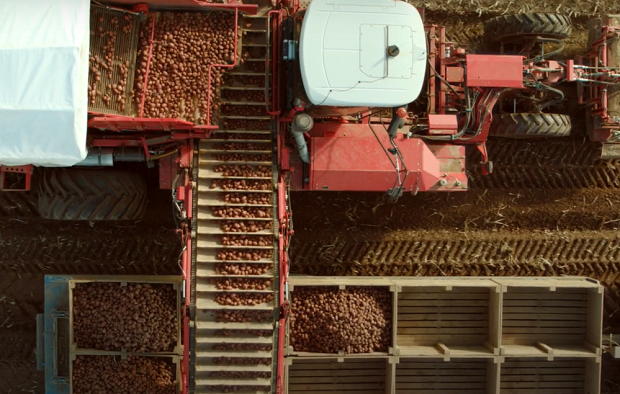Albert Bartlett unveils the 200 days of love and care involved in growing the grand spud which is the most thrown out food in the UK
 A fast motion film showcasing the lifespan of the great British potato aims to educate the nation on the 200-days of love and care involved in growing and looking after spuds. Albert Bartlett has released the clip, assembled from a series of stills and sped-up video footage, to mark Stop Food Waste Day (April 27, 2022) with hopes of encouraging Brits to think twice before chucking their potatoes in the bin.
A fast motion film showcasing the lifespan of the great British potato aims to educate the nation on the 200-days of love and care involved in growing and looking after spuds. Albert Bartlett has released the clip, assembled from a series of stills and sped-up video footage, to mark Stop Food Waste Day (April 27, 2022) with hopes of encouraging Brits to think twice before chucking their potatoes in the bin.
Spuds are the most thrown out food, by weight, across the country1 and around 4.4 million1 potatoes are wasted every week in the UK. The film, part of Albert Bartlett’s ‘School of Spuds’ initiative, hopes to highlight the growing and supply chain and encourage consumers to take care of their potatoes at home as they are cared for by farmers in the field, to ensure that no spud is wasted.
The film, shot over 12 months, takes the viewer on an educational journey, from seed to fork. The clip kicks off at one of the Perthshire farms growing for Albert Bartlett with spring planting, which has to be in dry soil, cleared of stones, before tonnes of seed potatoes are planted. Summer growth is next up, until eventually the stems are removed and we see the autumn harvest take place before the potatoes are transported from the fields to the Albert Bartlett factory. It’s here where the potatoes are washed in rainwater collected from the roof, carefully inspected, packed and despatched to stores.
Albert Bartlett hopes that the film will open the nation’s eyes to the long process involved in putting potatoes on people’s plates and will urge them to reconsider when reaching for the bin.
Michael Jarvis, Head of Marketing at Albert Bartlett, added: “The nation loves potatoes, that much is obvious, but not a lot of people truly understand the love, care and time involved in growing them. We created the footage to educate consumers on the process from start to finish – from seed to fork. In turn, we hope this will encourage people to take better care of their potatoes to help reduce waste. To you it may just be a potato but to us it’s a labour of love. We really hope our film captures that!”
Stop Food Waste Day is about educating and igniting change in the fight against wasted food. Albert Bartlett is keen for people to do their bit at home and has provided some pointers on general potato care to help reduce waste, from cooking to planting.
Did you know?
- Despite the hard exterior potatoes do bruise easily, so please handle with care.
- You can actually freeze your potatoes from fresh but you need to blanch first. Boil them whole for 4 or 5 minutes, then let them cool. If the potatoes have been fully cooked, you can also freeze any leftovers (though the texture of homemade mashed potato may be altered as the mash can become more watery after defrosting). We’d recommend popping the potatoes in an airtight container or sealed plastic bag once they’ve cooled.
- You can cut off sprouts and plant to create a potato plant.
When to eat, when to plant and when is acceptable to chuck!
- Normal potato (cook and enjoy)
- Slightly sprouted potato (remove eyes and sprouts, cook eat and enjoy)
- Slightly more sprouted potato (as above, still good)
- Very heavily sprouted potato (do not eat, plant!)
- Potato which has elements of green (throw away into the food waste bin)
As a business, Albert Bartlett takes steps to ensure it plays its part in protecting the environment.
- The introduction of new recyclable packaging which resulted in a cut of 92 tonnes of plastic across the business.
- Over 95% of water used for washing potatoes at the main Airdrie production site comes from rainwater captured from the roof or from bore holes.
- The water is recycled several times, being cleaned after every use at the company’s on-site water treatment plant.
- 25,000 trees have been planted at the brand’s Airdrie site.
- Bee hives are in place at production sites to encourage biodiversity.
- Clover crops are planted in key growing locations such as Jersey when potatoes are not in season to encourage biodiversity.
- All additional food/wood/card/plastic waste is recycled.
- All the soil washed off potatoes is returned to the fields.
- Sustainability is a key factor in all supplier and production partner procurement decisions.
https://www.albertbartlett.co.uk/school-of-spuds/
www.instagram.com/albert_bartlett/
www.twitter.com/Albert_Bartlett
www.facebook.com/albertbartlett1948/
1 – WRAP (Waste and Resources Action Programme).




Comments are closed.